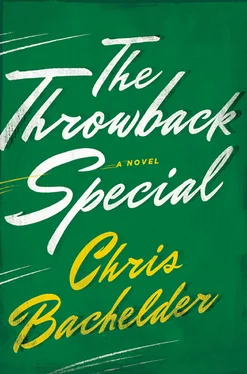Traditionally, the commissioner said a few words before starting the lottery. Nothing formal, nothing prepared, just a welcome, maybe a joke. The men grew quiet. Trent slung the pillowcase of ping-pong balls over his shoulder. This posture, combined with Trent’s recent weight gain, and perhaps with the thin hotel towels beneath the keg, and possibly also with the experience of waiting anxiously for a special annual event that would be over all too quickly, necessitating a return to normal life, evoked for some men the image of Santa Claus. Trent shifted his weight from foot to foot. His face glistened with sweat and tomato sauce, and he unconsciously wiped his forehead with the pillowcase. He removed from his back pocket a wrinkled piece of paper, then used his mouth to unfold the paper. This was one of the worst things that could have happened, and a wave of agitation passed through the crowded room.
“I’ve written an invocation,” Trent said. “A rhyming invocation.” He cleared his throat. “Now, if you would, please bow your heads.”
The men, all of them, stared into their cups. They could hear the tap of the cold rain on the window. This was quite possibly going to be worse than the year George was commissioner, when he circled the conference table, speaking slowly about the freedom of assembly, the value of ritual, and the theory of play espoused by Dutch cultural historian Johan Huizinga. He had touched all of the men as he passed their chairs.
“What a devout group of assholes,” Trent said, laughing. He balled up the sheet of paper and threw it at Myron. “Come on, let’s do this. Carl?”
Carl, still wearing the Jim Burt jersey, turned off the sconce lights above the beds, and turned on the projector, which he had made from a shoe box, a magnifying glass, and his phone. In this way the men could see, projected onto the wall above the television, the “board,” or list of players available for selection, which Carl would update after each man’s turn. Although this jury-rigged projection system was resourceful, and not vastly inferior to the system in the conference room, it nevertheless caused some mild embarrassment.
“Bravo, Carl,” Tommy said.
“Focus!” Andy said.
Trent lowered his hand into the pillowcase, first grazing the ping-pong balls gently with his fingertips, then plunging his fingers into the mass, scooping and mixing, rolling them across his moist palm. He pinched a ball (Chad’s) between his thumb and forefinger, then dropped it. He selected another ball, and gingerly lifted it from the sack like an egg of the endangered loggerhead turtle. Before looking at the name on the ball, he held it aloft, presenting it to the room.
“God, I think that might be mine,” Bald Michael whispered from the open door of the bathroom.
It was as one would expect: Some men in the room fervently wished to have the first selection. Gary was one of them. George. Wesley, strangely enough. Carl. Steven. These men wanted a full board, a large menu. They knew what they liked, and they were not frightened of options. And then there were other men who desperately did not want to choose first, who were at this moment, this and every year, filled with a sense of dread that their initials were on the ball in the commissioner’s hand. The prayer that they silently prayed was the same one they chanted as children beneath beds or behind woodpiles: Please, let me not be found . From the hallway came the sound of ice spilling violently into a bucket. Randy was one of these men. And Tommy. Robert, for whom choice was oppressive. Myron, like all Myrons. Bald Michael, who became paralyzed in the well-stocked aisles of supermarkets or home improvement stores. And perhaps especially for Derek, whose anxiety about the lottery, this and every year, was unique and complicated. Derek was concerned — nearly to the point of nausea, in fact — about the thorny psycho-
racial thicket into which he, a mixed-race man, would be plunged if the commissioner called his name. He could, with the first pick, just choose Lawrence Taylor . Throughout the years, most men had chosen Taylor with the first pick, either because they genuinely wanted to be Taylor, the prime mover of the drama, or, in one or two cases, because they worried what the other men would think if they did not choose Taylor. (In those years the reenactment had been marred by a mincing and tentative antihero.) But Derek had always been vaguely troubled by the portrayal of Taylor as villain — or, more accurately, as monster, a kind of soulless, inexorable beast who laid waste to Caucasian linemen on his way to the wavy-haired former Notre Dame quarterback who was dating Cathy Lee Crosby. Who leaped almost supernaturally onto Theismann’s back — who jumped him, basically — surprising Theismann at home at night in the safety of his pocket. Not content merely to sack Theismann, but intent on destroying him, snapping his bones, ending his career. Taylor as black devil, as bogeyman. A noble savage, at best. For the men, Derek thought, Taylor offered the opportunity not only to sublimate their roiling, middle-class aggression, but also to take a transgressive racial thrill ride. Not an emphatic immersion but a ritualized, sanctioned projection of fear and disgust. In a helmet, in a jersey, their volatile subconscious had an outlet that seemed both safe and dangerous. Was Derek making this all up? Of course Taylor had truly been a ferocious and relentless player who scared the daylights out of offensive players and coaches, but Derek could not help but feel a twinge of distaste about the way that some of the men played Taylor, with a kind of wild-eyed, watch-your-daughters primitivism, licensed both by Taylor’s revolutionary abilities and, unfortunately, by his considerable off-the-field troubles. Granted, you could not portray Taylor with the workaday, gap-toothed brutality of the archetypical white linebacker (Butkus, Nitschke, Lambert, Ham, Urlacher), but one needn’t venture into minstrelsy, either. So Derek, were he to choose first, could choose to choose Taylor, seizing the role for himself, rejecting caricature and adding nuance. He could modify, adapt, and deepen the portrayal, providing a model for those who followed. He could play Taylor with ferocity, but also with dignity and humanity and intelligence, and in this way he could perhaps subtly instruct his peers. But seriously, even if he could somehow see his way toward some authentic vision of Taylor, both distinctive and emblematic, did he really believe that he, a lone man with a righteous cause, could enact change? What kind of fantasy was that? Derek noticed for the first time that George had cut off his ponytail. And if he were thinking in terms of exemplum or emblem, wasn’t he already far, far away from an authentic and idiosyncratic representation of Taylor? Unless of course being a symbol was integral to Taylor’s particularity. Unless, that is, Taylor himself was playing a role, and so to portray Taylor was to take on the role of a role, to act like an actor. That sounded right. That sounded like being black. Wasn’t it true that Derek, too, felt at all times like both a distinctive person and a representative, man and mannequin? What would more likely happen, Derek knew, was that the role would seize him, and not the other way around. By choosing Taylor, he would create — reveal? create? reveal? — a metadramatic racial tension. Though light-skinned, Derek was black, and here he would be, irreducibly, a black man choosing Lawrence Taylor.
The ball there in Trent’s hand, held above his head. The quiet of the room. That chintzy projector, projecting far more than the board. Well, and of course the angry black man would select the frightening black man. And now look, the entire group of men would be made uncomfortably aware of the racial dynamics of reenactment, which was good because white people needed to be far more aware of the subtext of race. Which was terrible, because they were all here to have fun. Derek, too. This was one of his favorite events of the year, even if the other men tended to come on a bit strong. He liked being part of the group, studying film, wearing the uniform. He liked the collective pursuit, each man doing his job so that that play could be successfully catastrophic. So why was he doing this? What was his problem? Why did he insist on turning something fun into a grave American ordeal? What kind of pathology seeks to diminish pleasure and play? Oh, and Derek just knew how it would look if he chose Taylor. Here he had been, playing along for years, lying in wait, biding his time patiently, yearning for his opportunity to play Taylor, to (re)enact, symbolically, racial vengeance not just upon Theismann and the Redskins — good Lord, they were named the Redskins — but upon the man playing Theismann, and upon the whole group of men, and really upon all white people everywhere. It was so obvious that Derek would choose Taylor, for at heart he was just an angry black man. Which he wasn’t, because he would not be reduced like that. Which he was, because who wouldn’t be? Selecting Taylor — it was so clear — would not be an opportunity for racial healing and gentle instruction, but an outright act of hostility and aggression. He, Derek, would not control the meaning and significance of Lawrence Taylor’s sack. Centuries of American history would control the meaning and significance of Taylor’s sack. It was the worst kind of soft, sentimental thinking to imagine that an individual by force of will and conviction might provide. . Plus, Jesus, he detested the thought that such a vexed decision would be regarded as such an obvious decision. And never mind the profound rhetorical challenge of actually uttering his selection of Taylor, of speaking it to the group in a hotel room. If he said it forthrightly, confidently, he would create discomfort and fear. If he shucked and jived to comfort his peers, he would activate his dormant self-hatred. And there were other variations — should he pause, appear to be uncertain — each of them fundamentally dishonest. So okay, over the years it had become pretty clear to Derek that he could not choose Lawrence Taylor, lest he convert the Throwback Special forevermore into a charged racial allegory (which it really already was!), and convert himself from one of the guys to type and ambassador (which he really already was!). But Derek knew that not choosing Taylor was also a decision laden with significance. If he selected another player, he would not be primarily choosing that player; he would first and foremost be not choosing Taylor . He would in essence be renouncing Taylor and all that Taylor represents. It would be an evasion, a denial. A betrayal? The not-choice would resound as a choice, and quite possibly as deficiency or fear. And whom would he choose instead? He had worked it out many times. He could be black Giants safety Kenny Hill. Yes, he could station himself as far as possible from ball and bones, could in fact move away from the collapsing pocket, far beyond the camera’s eye. He could excise himself from the historical record. That would be a forceful racial statement indeed. Or he could be black Giants linebacker Harry Carson. He could charge with Taylor, swell the progress. He could get to Theismann first, make him step up in the pocket, prepare him for comminution. But that would look to all like Derek wanted to be involved, but could not handle the heavy symbolic burden of Taylor. Or hell, he could go white! This was his way out of the conundrum. This was the escape hatch. He could be Didier! He could be the Redskins second tight end, a beefy Caucasian named Clint . That would show them all! It was devastatingly clever. It was Derek as trickster, subverting the group and the performance through ironic appropriation. Or something. But Derek was not convinced that choosing Clint Didier or any of the other seven white Redskins would actually expose or undermine the system in any meaningful way. It would probably just look odd, and perhaps even cowardly. It might look like he was trying to pass. It might arouse pity. It might appear to be another instance of racial self-loathing. Or it might after all actually be another instance of racial self-loathing. With the first pick — there was no way around this — you were either Lawrence Taylor or you were not Lawrence Taylor, and both choices were fraught. There was no other option. Derek wanted to take a large drink from his beer, but he worried his hand would shake. He was relatively certain that none of the other men, not even Charles, had ever considered the racial dimensions of the lottery, and he knew they would not unless and until the year that Derek’s name was called first. No, not even then. It would not be until Derek spoke, until he chose, at which point Derek would be guilty of introducing an ugly topic into a fun and friendly tradition. He was desperate for the ball in Trent’s raised hand to be his ball, and also for the ball not to be his ball.
Читать дальше












